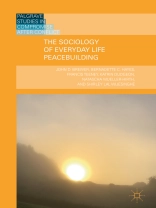This book uses in-depth interview data with victims of conflict in Northern Ireland, South Africa and Sri Lanka to offer a new, sociological conceptualization of everyday life peacebuilding. It argues that sociological ideas about the nature of everyday life complement and supplement the concept of everyday life peacebuilding recently theorized within International Relations Studies (IRS). It claims that IRS misunderstands the nature of everyday life by seeing it only as a particular space where mundane, routine and ordinary peacebuilding activities are accomplished. Sociology sees everyday life also as a mode of reasoning. By exploring victims’ ways of thinking and understanding, this book argues that we can better locate their accomplishment of peacebuilding as an ordinary activity. The book is based on six years of empirical research in three different conflict zones and reports on a wealth of interview data to support its theoretical arguments. This data serves to give voice to victims who are otherwise neglected and marginalized in peace processes.
İçerik tablosu
Chapter 1. Introduction.- Chapter 2. Centring Victims in Peacebuilding.- Chapter 3. Northern Ireland Voices.- Chapter 4. South African Voices.- Chapter 5. Sri Lankan Voices.- Chapter 6. Everyday Life Peacebuilding. Chapter 7. Conclusion.
Yazar hakkında
John D. Brewer, Queen’s University Belfast, UK
Bernadette C. Hayes, University of Aberdeen, UK
Francis Teeney, Queen’s University Belfast, UK
Katrin Dudgeon, Queen’s University Belfast, UK
Natascha Mueller-Hirth, Robert Gordon University, UK.
Shirley Lal Wijesinghe, University of Kelaniya, Sri Lanka.












